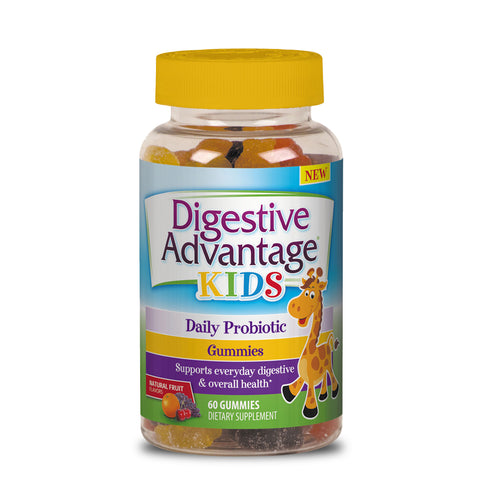A child’s health is an important issue for any parent, and one of the biggest battles can be ensuring they stay physically fit and maintain a balanced diet. Today, an average of one in three American children and teenagers are overweight or obese[1]. Obesity in children can cause them to have scary ‘adult like’ health issues such as high blood pressure, type 2 diabetes and increased cholesterol levels[1].
Digestive health is a key element of overall wellbeing, and it’s important to help children create a positive relationship with food and exercise from a young age. Here, we will outline a number of ways in which you can help your child develop good habits when it comes to their digestive health.

1. Inspire your child to try new foods
It takes children time to adjust to new tastes and textures, so they are unlikely to warm to new foods instantaneously. If your child expresses distaste when trying a new food, don’t force them to continue eating it, but don’t abandon it all together. Reintroduce it again at a later date, perhaps prepared differently, and see if their reaction changes[2]. Generate interest in mealtimes by involving children in food preparation, allowing them to add ingredients and help with serving. The sense of ownership this creates will make them more likely to want to try the dishes they helped to cook.
When planning meals, involve your child in decisions about what healthy vegetables will be included; however, avoid giving them the opportunity to opt out of all available choices by phrasing your questions carefully. Ask “would you prefer peas or carrots with lunch?” as opposed to “would you like peas with lunch?”.

2. Prevent your child from overeating
Young children are able to listen to their bodies, so they can usually detect when they are hungry and when they are full. Encourage portion control by using smaller plates and bowls and allow them to serve themselves the portions they want from an early age2. Create a regular eating routine including three meals and one or two snacks each day and stick to it as closely as you can. Don’t force children to continue eating once full, and set a good example by managing your own eating habits in a similar way. If you are worried about your child over or undereating, consult with your doctor for guidance.
3. Limit processed foods
Processed foods are easy to slip into your diet without you even realizing. Salad dressings, premade pasta sauces and even ketchup usually come with added sugars, sodium and artificial preservatives, giving them all the sweet taste and long shelf life that we love; but they don’t do our bodies any favors. The Food and Drug Administration defines processed foods as anything that has been subjected to processing methods such as; canning, freezing, dehydrating, cooking or milling[3]. Not all processed foods are unhealthy, however it is harder to detect the presence of unhealthy ingredients in foods you haven’t prepared yourself.
Avoid banning junk foods all together as this is likely to increase the temptation when these foods become available to your child outside of your home. Do not use restrictions on sweets and treats as punishment for bad behaviour as this can generate an unhealthy relationship with food. Offer fresh fruits and vegetables as alternatives to less healthy snacks, and keep an eye on portion sizes when you do allow children to indulge in processed foods.
4. How exercise can help
It seems like an obvious one, but regular exercise can help with your child’s digestion. Yoga stretches can be beneficial to digestive health - gentle twisting at the hip poses can increase blood flow to the bowels, reduce inflammation and strengthen the intestines[4]. Movements stimulate the intestinal contractions, aiding the passage of stool through the colon[5].
While you are unlikely to want to take your child to the gym with you, playing in the park or a game of hide and seek at home will keep them active, while providing a bonding experience for you and helping them to burn off excess energy.
5. Give your child probiotic supplements regularly
Everything about your child reflects their health – keeping an eye on their energy levels, mood and how they go to the bathroom are great ways to assess their diet.
For overall digestive and immune health, probiotics are a great addition to everyone’s diet. The basic premise of using probiotics is to restore the relative population of good bacteria in the gut, which can promote optimal health. Children's probiotics can help lessen minor abdominal discomfort, bloating & occasional diarrhea.

Digestive Advantage Kids Daily Probiotic Everyday Health Gummies deliver more live good bacteria to help your kids get the benefits of probiotics to support digestive health*. Digestive Advantage Kids gummies are made with natural fruit flavors for a fun format of probiotics that are great tasting. Your child would want to take them!
*THESE STATEMENTS HAVE NOT BEEN EVALUATED BY THE FOOD AND DRUG ADMINISTRATION. THESE PRODUCTS ARE NOT INTENDED TO DIAGNOSE, TREAT, CURE OR PREVENT DISEASE.
[1] “What is childhood obesity?” American Heart Association. 12 Feb 2016. http://www.heart.org/HEARTORG/HealthyLiving/HealthyKids/ChildhoodObesity/What-is-childhood-obesity_UCM_304347_Article.jsp#.Wvrfc7pFy71
[2] Chan, Amanda et al. “10 Ways to Promote Kids’ Healthy Eating Habits” Live Science. 22 Sept 2011. www.livescience.com/35876-kids-healthy-eating-tips.html
[3] “Guidance for Industry: Antimicrobial Food Additives” U.S. Food and Drug Administration. 11 Oct 2017. www.fda.gov/Food/GuidanceRegulation/GuidanceDocumentsRegulatoryInformation/ucm077256.htm
[4] Melone, Sara “How Does Exercise Improve Digestion?” AZ Central. Undated. https://healthyliving.azcentral.com/exercise-improve-digestion-4714.html
[5] Vann, Madeline. “The Best Moves to Aid Digestion” Everyday Health. 21 May 2013. www.everydayhealth.com/digestive-health-pictures/the-best-moves-to-aid-digestion.aspx
